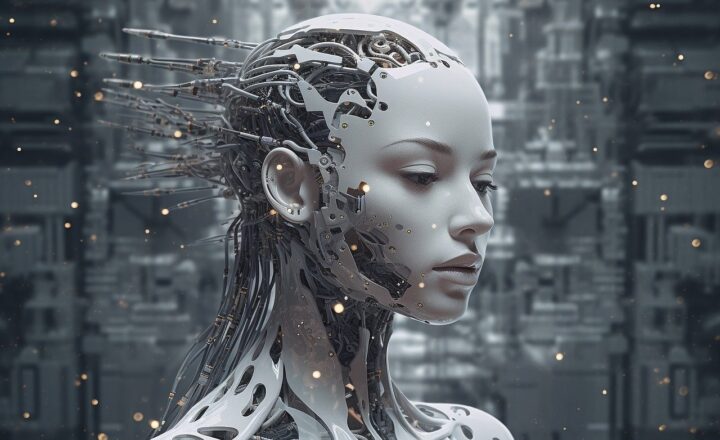
Artificial Intelligence (AI) has rapidly transcended from a niche field in tech to a transformative force that shapes various aspects of life. From revolutionizing industries to altering human experiences, AI is at the forefront of change. In this article, we delve into the myriad of ways AI is poised to impact humanity’s future, evaluating its advantages, challenges, and the ethical considerations that come with it.
1. Understanding Artificial Intelligence
AI refers to the simulation of human intelligence in machines designed to think, learn, and adapt like humans. It encompasses various technologies such as machine learning, natural language processing, robotics, and computer vision. By analyzing vast datasets, AI systems learn to make predictions and informed decisions, often surpassing human capabilities in specific tasks.
What makes AI particularly compelling is its flexibility; it can be applied across sectors like healthcare, finance, education, and entertainment. With advancements in algorithms and access to massive data, AI is evolving at an unprecedented rate.
2. AI in Everyday Life
AI integration into daily life is becoming more prevalent, often unnoticed. Here are a few recent developments:
- Virtual Assistants: Platforms like Siri, Alexa, and Google Assistant have become staples in many households. They facilitate tasks, answer queries, and control smart home devices, making life more convenient.
- Personalization: Companies like Netflix or Spotify utilize AI to analyze user preferences and recommend content tailored to individual tastes, thus enhancing user experiences.
- Customer Service Chatbots: Many businesses now deploy chatbots powered by AI for 24/7 customer service. These bots address common queries without human intervention, allowing for efficient service delivery.
As AI continues to blend into everyday technology, users are becoming increasingly reliant on its capabilities.
3. Revolutionizing Industries
AI is an agent of change across various sectors:
- Healthcare: AI enables earlier diagnosis through advanced image recognition capabilities and predictive analytics. From drug discovery to personalized medicine, AI is reshaping patient outcomes while reducing costs.
- Finance: AI algorithms analyze market trends and customer behavior for investment strategies, fraud detection, and financial forecasting, enhancing security and profitability.
- Transport: Autonomous vehicles are one of the most talked-about applications of AI. With advancements in computer vision and sensory technology, self-driving cars promise to revolutionize transportation, improving road safety and accessibility.
The applications of AI are far-reaching and hold significant implications for efficiency and innovation within these industries.
4. The Advantages of Artificial Intelligence
AI presents numerous potential benefits:
- Increased Efficiency: AI technology can perform repetitive tasks faster and more accurately than humans, thus freeing up time for more complex problem-solving efforts.
- Enhanced Decision-Making: By analyzing large datasets, AI can uncover patterns and insights that facilitate data-driven decisions, leading to better outcomes in business and governance.
- 24/7 Availability: AI systems can operate without fatigue or breaks, making them ideal for roles requiring constant attention and quick responses, such as security monitoring or customer support.
These advantages illustrate how AI can significantly enhance productivity and effectiveness across multiple domains.
5. The Challenges and Risks of AI
While the prospects of AI are enticing, there are significant challenges and risks:
- Job Displacement: Automation may replace many jobs, particularly those involving repetitive tasks, leading to economic disruption and workforce displacement if not managed properly.
- Ethical Concerns: The use of AI in surveillance, data privacy, and decision-making raises ethical dilemmas. How we regulate these technologies will determine their impact on individual rights and freedoms.
- Algorithmic Bias: AI systems can inadvertently perpetuate bias if trained on flawed data. Ensuring fairness and transparency in AI algorithms is crucial to avoid adverse social impacts.
It’s essential to address these challenges proactively to harness the power of AI responsibly.
6. Future Outlook: Balancing Benefits and Risks
Looking ahead, the trajectory of AI development must balance innovation with regulation. Initiatives such as ethical AI frameworks will ensure that technology serves humanity positively.
Investments in AI education and upskilling will prepare the workforce for new opportunities while mitigating job displacement. Furthermore, involving diverse stakeholders in AI policy-making will promote inclusive and equitable technological growth.
As AI technology evolves, it necessitates a re-examination of societal values, norms, and policies to safeguard interests for all.
Conclusion
The future of AI presents boundless opportunities to enhance lives and innovate across industries. However, this potential comes with responsibilities that must be upheld through ethical considerations, thoughtful policies, and active engagement from all sectors. With the right approach, AI can become an ally in humanity’s pursuit of progress, efficiency, and well-being.
As we move forward, embracing the power of AI while addressing its challenges will define our relationship with this transformative technology, ultimately shaping what our future holds.







